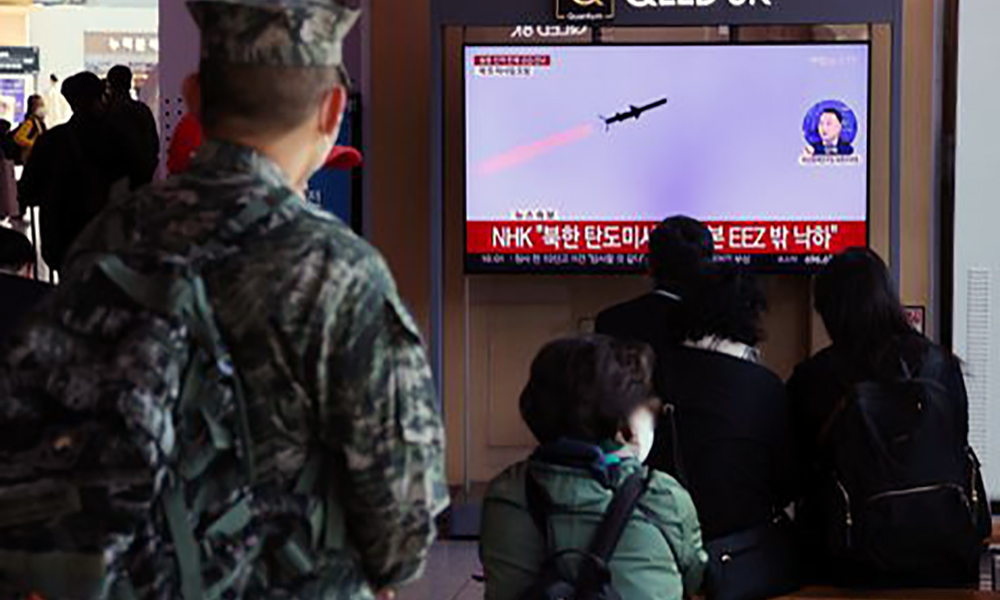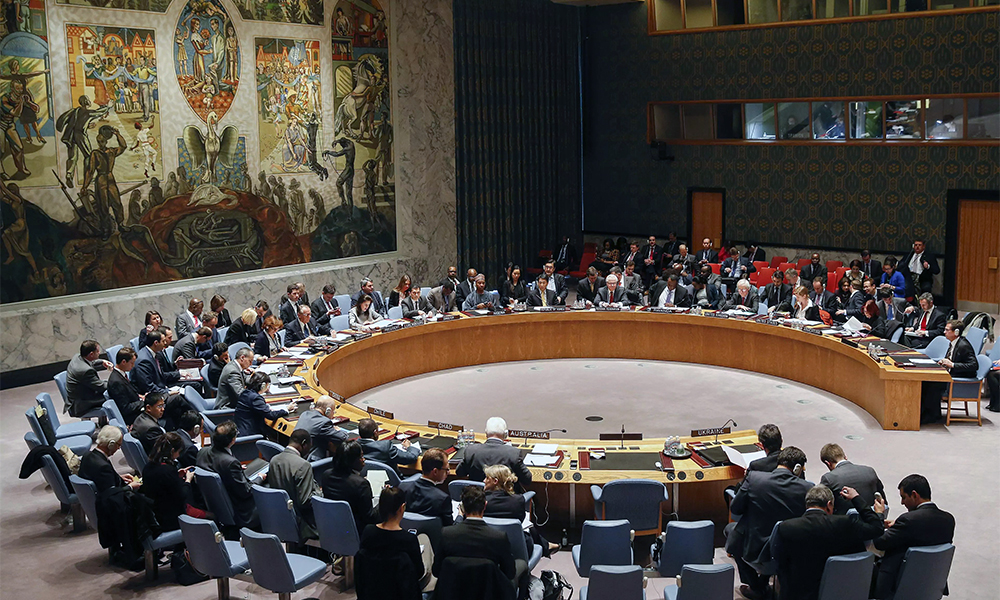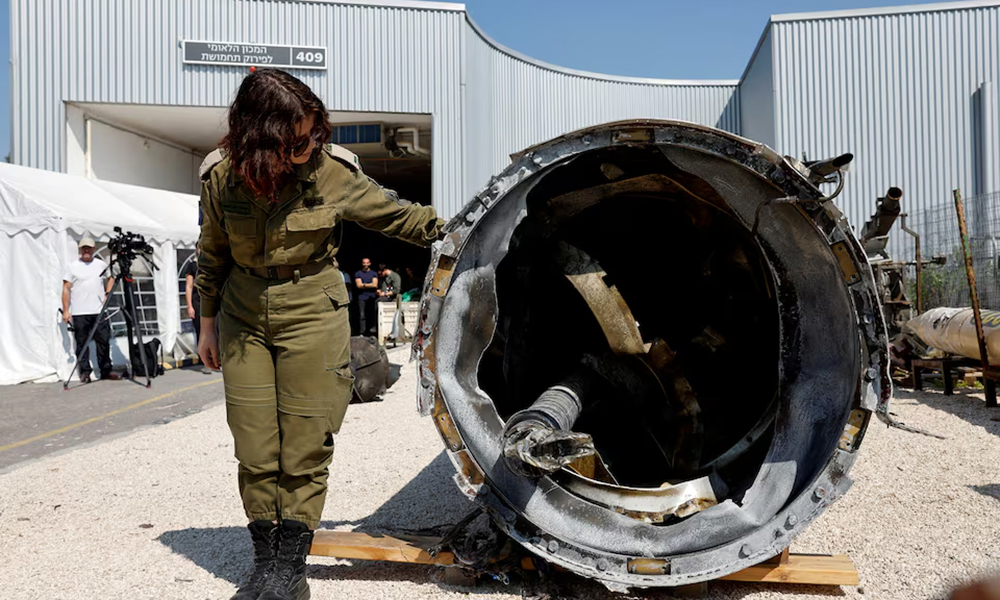World
N. Korea fires 23 missiles, one landing off South Korean coast for first time

North Korea fired at least 23 missiles into the sea on Wednesday, including one that landed less than 60 km (40 miles) off South Korea’s coast, which South Korean President Yoon Suk-yeol described as “territorial encroachment” and Washington denounced as “reckless”, Reuters reported.
It was the first time a ballistic missile had landed near the South’s waters since the peninsula was divided in 1945, and the most missiles fired by the North in a single day. South Korea issued rare air raid warnings and launched its own missiles in response.
According to Reuters the launches came just hours after Pyongyang demanded that the United States and South Korea stop large-scale military exercises, saying such “military rashness and provocation can be no longer tolerated”.
In Washington, White House national security spokesperson John Kirby called the North Korean launches “reckless” and said the United States would make sure it had the military capabilities in place to defend its treaty allies South Korea and Japan.
The missile landed outside South Korea’s territorial waters, but south of the Northern Limit Line (NLL), a disputed inter-Korean maritime border.
South Korean warplanes fired three air-to-ground missiles into the sea north across the NLL in response, the South’s military said. An official said the weapons used included an AGM-84H/K SLAM-ER, which is a U.S.-made “stand-off” precision attack weapon that can fly for up to 270 km (170 miles) with a 360-kg (800-lb) warhead, read the report.
The South’s launches came after Yoon’s office vowed a “swift and firm response”.
“President Yoon Suk-yeol noted North Korea’s provocation today was an effective act of territorial encroachment by a missile intruding the NLL for the first time since (the two Koreas’) division,” his office said.
When asked whether the missile was flying towards the South’s territory and should have been intercepted, a senior presidential official said, “Strictly speaking, it did not land in our territory but in the Exclusive Economic Zone under our jurisdiction, therefore it was not subject to interception”.
According to Reuters North Korea has continuously been launching missiles over the past year in violation of multiple U.N. Security Council resolutions, U.S. Ambassador to the United Nations Linda Thomas-Greenfield said.
“It’s unprecedented in the sense that there were so many,” she said of Wednesday’s launches.
Kirby told his news briefing that the United States has information that indicates North Korea is covertly supplying Russia with a “significant” number of artillery shells for its war in Ukraine and that Washington would consult with the United Nations on accountability issues over the shipments.
Kirby said North Korea was attempting to obscure the shipments by funnelling them through countries in the Middle East and North Africa.
North Korea said in September it had never supplied weapons or ammunition to Russia and has no plans to do so, Reuters reported.
The missile that crossed the NLL was one of three short-range ballistic missiles fired from the North Korean coastal area of Wonsan into the sea, South Korea’s Joint Chiefs of Staff (JCS) said. The JCS later said as many as 14 other missiles of various types had been fired from North Korea’s east and west coasts.
The JCS said at least one landed 26 km south of the NLL, 57 km from the South Korean city of Sokcho, on the east coast, and 167 km from the island of Ulleung, where air raid warnings were sounded.
“We heard the siren at around 8:55 a.m. and all of us in the building went down to the evacuation place in the basement,” an Ulleung county official told Reuters. “We stayed there until we came upstairs at around 9:15 after hearing that the projectile fell into the high seas.”
The North also fired more than 100 rounds of artillery from its east coast into a military buffer zone, South Korea’s military said. The firing violated a 2018 military agreement banning hostile acts in border areas, the JCS said.
North and South Korea are technically still at war because their 1950-53 conflict ended in a truce, not a peace treaty, read the report.
Nuclear-armed North Korea has tested a record number of missiles this year, and officials in Seoul and Washington say the North has completed technical preparations to conduct a nuclear weapon test for the first time since 2017.
Despite Yoon’s declaring a national week of mourning after more than 150 people were killed in a weekend crowd surge in Seoul, the United States and South Korea began one of their largest combined military air drills on Monday. Dubbed Vigilant Storm, the exercises involve hundreds of warplanes from both sides staging mock attacks 24 hours a day.
North Korea, which for years has pursued missile and nuclear programmes in defiance of U.N. sanctions, had said that a recent flurry of launches were in response to allied drills, Reuters reported.
Pak Jong Chon, secretary of the Central Committee of North Korea’s ruling Workers’ Party, said in a statement on Wednesday that the number of warplanes involved in Vigilant Storm proved the exercise was “aggressive and provocative” and specifically targeted North Korea. He said even its name imitated the U.S.-led Operation Desert Storm against Iraq in the 1990s.
U.S. State Department spokesperson Ned Price said that the drills were purely defensive and harboured no hostile intent. Price added that Washington and its allies had also made clear that there would be “profound costs and profound consequences” if North Korea resumed nuclear testing. He did not elaborate.
Chinese Foreign Ministry spokesperson Zhao Lijian told a regular briefing in Beijing that safeguarding peace and stability on the peninsula was in everyone’s interest.
“We hope that all parties concerned will stick to the direction of political settlement of the Peninsula issue, meet each other halfway, and prevent the situation from escalating,” he said.
South Korea’s Ministry of Land, Infrastructure and Transport said that because of the launches, some air routes over the sea between North Korea and Japan would be closed until Thursday.
World
UN Security Council to vote Friday on Palestinian UN membership

The United Nations Security Council is scheduled to vote Friday on a Palestinian request for full U.N. membership, said diplomats, a move that Israel ally the United States is expected to block because it would effectively recognize a Palestinian state.
The 15-member council is due to vote at 3 pm Friday on a draft resolution that recommends to the 193-member U.N. General Assembly that “the State of Palestine be admitted to membership of the United Nations,” diplomats told Reuters.
A council resolution needs at least nine votes in favor and no vetoes by the U.S., Britain, France, Russia or China to pass. Diplomats say the measure could have the support of up to 13 council members, which would force the U.S. to use its veto.
Council member Algeria, which put forward the draft resolution, had requested a vote for Thursday afternoon to coincide with a Security Council meeting on the Middle East, which is due to be attended by several ministers.
The United States has said that establishing an independent Palestinian state should happen through direct negotiations between the parties and not at the United Nations.
“We do not see that doing a resolution in the Security Council will necessarily get us to a place where we can find … a two-state solution moving forward,” U.S. Ambassador to the U.N. Linda Thomas-Greenfield said on Wednesday.
The Palestinians are currently a non-member observer state, a de facto recognition of statehood that was granted by the 193-member U.N. General Assembly in 2012. But an application to become a full U.N. member needs to be approved by the Security Council and then at least two-thirds of the General Assembly.
The U.N. Security Council has long endorsed a vision of two states living side by side within secure and recognized borders. Palestinians want a state in the West Bank, east Jerusalem and Gaza Strip, all territory captured by Israel in 1967.
Little progress has been made on achieving Palestinian statehood since the signing of the Oslo Accords between Israel and the Palestinian Authority in the early 1990s.
World
EU leaders back new Iran sanctions after attack on Israel

European Union leaders decided on Wednesday to step up sanctions against Iran after Tehran’s missile and drone attack on Israel left world powers scrambling to prevent a wider conflict in the Middle East, Reuters reported.
The summit in Brussels is the first meeting of the EU’s 27 national leaders since Saturday’s attack, more than six months into the war between Israel and the Iran-backed Palestinian militant group Hamas.
Israel has signalled it will retaliate but has not said how. EU leaders condemned the Iranian attack, reaffirmed their commitment to Israel’s security and called on all sides to prevent more tensions, including in Lebanon.
“We feel it’s very important to do everything to isolate Iran,” said summit chairman Charles Michel, adding the new sanctions against the Islamic Republic would target companies involved in the production of drones and missiles.
German Chancellor Olaf Scholz said it was important that Israel “does not respond with a massive attack of its own.”
Italy spoke separately ahead of G7 talks in favour of sanctions against arms suppliers linked to the attack against Israel, as well as those behind attacks on ships in the Red Sea, read the report.
Iran launched its assault in response to an April 1 strike on its embassy in Damascus which it blamed on Israel. Tel Aviv started its broader military offensive in Gaza after Hamas’ deadly attack on Israel on Oct. 7.
ISRAEL AND UKRAINE
EU foreign ministers are due to continue the sanctions work on Monday as the United States and its Western allies hope new steps against Iran will help limit any Israeli retaliation.
The EU already has multiple programmes that target Iran for human rights abuses, the proliferation of weapons of mass destruction, and Tehran’s support for Russia’s war in Ukraine, Reuters reported.
Germany, France and several EU states are looking at expanding a scheme that seeks to curb the supply of Iranian drones to Russia to include the provision of missiles and cover deliveries to Iranian proxies in the Middle East.
Belgium backed introducing sanctions against Iran’s Revolutionary Guard Corps but Scholz said that required further legal checks. The bloc’s top diplomat has said that could only happen if a national authority in the EU found that the group had been involved in terrorist activity.
Analysts say Iran is unlikely to face more severe economic punishment because of worries about boosting oil prices and angering top buyer China.
With the Middle East capturing much of the EU’s attention, Ukraine’s President Volodymyr Zelenskiy appealed for more help in holding the line against Russia, which unleashed an invasion against its neighbour more than two years ago, read the report.
“Here in Ukraine, in our part of Europe, unfortunately, we do not have the level of defence that we all saw in the Middle East a few days ago,” Zelenskiy told the summit, after Israel and allies mostly shot down the incoming drones and missiles.
“It reflects our current key need – the need for air defence,” he said, according to an EU official, repeating his calls for speedier deliveries of the weapons and ammunition previously promised to Ukraine.
World
US and allies plan more Iran sanctions; Israel war cabinet to meet again

The U.S. and its allies planned fresh sanctions against Iran over its unprecedented attack on Israel, seeking to dissuade Israel from a major escalation as its war cabinet was set to meet for a third time on Wednesday to decide a response, Reuters reported.
While Saturday night’s attack caused no deaths and little damage thanks to the air defences and countermeasures of Israel and its allies, it has increased fears that violence rooted in the six-month-old Gaza war is spreading, with the risk of open war between long-time adversaries Iran and Israel.
Israel’s military chief of staff Herzi Halevi had promised Iran’s launch of more than 300 missiles, cruise missiles and drones at Israeli territory “will be met with a response”, but gave no details.
An Israeli government source said the war cabinet session scheduled for Tuesday had been put off until Wednesday, without elaborating, read the report.
Hoping to steer Israel away from massive retaliation, the U.S. and Europe flagged a toughening of economic and political sanctions against Iran.
The U.S. is planning to impose new sanctions targeting Iran’s missile and drone programme in the coming days and expects its allies will be following suit, National Security Advisor Jake Sullivan said in a statement on Tuesday.
Earlier, Treasury Secretary Janet Yellen said the U.S. would use sanctions, and work with allies, to keep disrupting Iran’s “malign and destabilising activity”.
She told a news conference in Washington all options to disrupt Iran’s “terrorist financing” were on the table, and she expected further sanctions against Iran to be announced soon.
European Union foreign policy chief Josep Borrell, speaking in Brussels after an emergency video conference of EU foreign ministers, said some member states had asked for sanctions against Iran to be expanded and that the bloc’s diplomatic service would begin working on the proposal.
Borrell said the proposal would expand a sanctions regime that seeks to curb the supply of Iranian drones to Russia so that it would also include the provision of missiles and could also cover deliveries to Iranian proxies in the Middle East.
Israeli Foreign Minister Israel Katz said he was “leading a diplomatic attack”, writing to 32 countries to ask them to place sanctions on Iran’s missile programme and follow Washington in proscribing its dominant military force, the Revolutionary Guard Corps, as a terrorist group, Reuters reported.
‘CALM HEADS’
Iran launched the attack in retaliation for an airstrike on its embassy compound in Damascus on April 1 attributed to Israel, but has signalled that it now deems the matter closed.
President Joe Biden told Israeli Prime Minister Benjamin Netanyahu at the weekend that the United States, Israel’s main protector, would not participate in an Israeli counter-strike.
British Prime Minister Rishi Sunak told Netanyahu in a call on Tuesday that escalation in the Middle East was in nobody’s interest and would only worsen insecurity in the region, so it was “a moment for calm heads to prevail”, Sunak’s office said.
Japan Foreign Minister Yoko Kamikawa “strongly urged Israel to exercise restraint” during a call with her Israeli counterpart Israel Kantz on Tuesday evening, according to a readout of the call issued by Japan’s foreign ministry.
The prospect of Israeli retaliation has alarmed many Iranians already enduring economic pain and tighter social and political controls since major protests in 2022-23, read the report.
Since the war in Gaza began in October, clashes have erupted between Israel and Iran-aligned groups based in Lebanon, Syria, Yemen and Iraq.
Israel said four of its soldiers were wounded hundreds of metres inside Lebanese territory overnight, the first known Israeli ground penetration into Lebanon since the Gaza war erupted, although it has regularly traded fire with the heavily armed Lebanese Hezbollah militia.
In Gaza itself, where more than 33,000 Palestinians have been killed in the Israeli offensive according to Gaza health ministry figures, Iran’s action drew applause.
Israel began its campaign against Hamas, the Iranian-backed Palestinian militant group that runs Gaza, after the militants attacked Israel on Oct. 7, killing 1,200 people and taking 253 hostages, by Israeli tallies.
-

 Sport4 days ago
Sport4 days agoACL fever grows as fixtures finalized
-

 World4 days ago
World4 days agoUS will not take part in any Israeli retaliatory action against Iran
-

 Latest News4 days ago
Latest News4 days agoOver 50 people dead in traffic accidents over Eid
-

 Latest News4 days ago
Latest News4 days agoUS identifies Kabul airport suicide bomber
-

 Latest News4 days ago
Latest News4 days agoGood rains enable DABS to increase power production in Kabul
-

 Business4 days ago
Business4 days agoAfghanistan-Kazakhstan chamber of commerce opens in Herat
-

 World3 days ago
World3 days agoIsraeli military vows response to Iran attack as calls for restraint mount
-

 Latest News3 days ago
Latest News3 days agoPakistani police give Afghans in Balochistan one day to leave
























